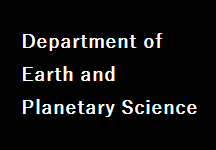






Education
Department of Earth and Planetary Science covers extremely wide research area. In terms of the space, the area covers the solid earth consisting of crust, mantle, and core, the fluid earth including ocean and atmosphere, biosphere that extends along the boundary between the solid and liquid parts of the earth, and their assemblage, the earth system. The area further extends into solar system including its planets, satellites, and planetary space. In time scale, the research area ranges from more than 4.6 Giga years ago before the birth of the solar system through the present to the future. We also employ various approaches, including field survey and observation that are essential for recognizing and describing the diversity and complexity of the nature, experimental, analytical, and theoretical approaches that are indispensable to extract universality from the obtained data, and modeling and simulation that are useful to understand the observed diversity and complexity under the unified concept of the earth system. Recently, rapid advance in science and technology surrounding the earth and planetary sciences has gradually been enabling us to analyze the earth along the time sequence from its origin and evolution through predictive changes in the future through an understanding that the earth comprises a single system consisting of the solid earth, surface environments, and surrounding planetary space that interact with one another intricately.
In order to sustain and further develop such major trends in the earth and planetary sciences, it is necessary to keep producing experts highly specialized in research, engineering, and research administration in the fields of earth and planetary sciences. Such experts should also be armed with a wide scope, highly sophisticated technical knowledge and ability, and an international mind. On the other hand, principles and techniques of earth and planetary sciences have been increasingly applied to fields such as prevention of natural hazards and environmental protection and assessments, leading to more demands by the general public and industries for experts with a wide scope and highly sophisticated technical knowledge and ability in earth and planetary sciences.
Department of Earth and Planetary Science set the aim of its education to produce researchers who possess wide scopes, deep technical knowledge, and high creativity, as well as engineers with wide and solid technical knowledge who can satisfy various social demands.
Aims and general principles of our education
In our department, we aim to produce researchers possessing wide scopes, deep technical knowledge, and high creativity who lead new development in earth and planetary sciences described above, as well as engineers with wide and solid technical knowledge who can deal directly with environmental issues and natural hazards such as earthquakes, volcanic eruptions, and abnormal weathers and can respond to social needs. In order to achieve these educational goals, we have established the following programs.
Undergraduate Programs: We have two undergraduate programs, Earth and Planetary Physics Program and Earth and Planetary Environmental Science Program. Through interactions between these programs, our education emphasizes on understanding and acquiring the basic concepts and skills in earth and planetary sciences.
Master’s Program: In our master’s program, we have two courses. One is for students who aim to proceed to the doctorate program and become researchers, and emphasizes on graduate course works in basic and advanced classes. The other is for those who aim to become science engineers, and emphasizes mostly on a wide range of basic classes.
Doctorate Program: In our doctorate program, we aim to provide students with a variety of education, including seminars consisting only of a few students and giving advices for each student’s research, so that each student will become a researcher with high creativity through nurturing a wide scope of research and sophisticated technical knowledge.
Educational System
The goal of our department is to form the core of research and education in earth and planetary sciences in Japan. In order to achieve this goal, five core groups based in Hongo (Atmospheric and Oceanic Science Group, Space and Planetary Science Group, Earth and Planetary System Science Group, Solid Earth Science Group, and Geosphere and Biosphere Science Group) corporate in research and education, in addition to working closely with numerous institutions in The University of Tokyo (Atmosphere and Ocean Research Institute, Earthquake Research Institute, Institute for Solid State Physics, Center for Spatial Information Science, Research Center for Advanced Science and Technology, The University Museum, Graduate School of Frontier Sciences, Graduate School of Arts and Sciences, Geochemical Research Center, Department of Astronomy, and Department of Physics) as well as outside institutions (Japan Aerospace Exploration Agency, High Energy Accelerator Research Organization, etc.).
Credits requirements for degrees and overview of our curriculums
The educational scheme in graduate programs is as illustrated below. Dependent on the background of undergraduate studies, each student has a flexibility of combining basic and more advanced, specific courses/classes for her/his curriculum.
Master’s Program
Education in our master’s program aims to nurture research-oriented and engineering-oriented experts with wide scope and deep knowledge on specific fields of earth and planetary sciences. Because more than 60% of our master’s students have undergraduate degrees from institutions other than our two undergraduate, earth and planetary science departments and many of them have had no academic trainings in these fields, we offer introductory courses in the masters’ program so that the students with no earth and planetary science background can learn basic knowledge common to all the specific fields of earth and planetary sciences. In addition, students can take undergraduate courses for credits. We have selected and arranged basic courses so that students will systematically learn basic knowledge in the specific fields that is necessary for conducting advanced research in the doctorate program. Furthermore, we offer highly specific and advanced courses such as special lectures and intensive classes (a few entire days devoted to one class) in each filed mainly for interested doctorate students who have a good understanding in the field. Brief descriptions of course are summarized in the class list.
For a master’s degree, students are required to obtain at least 30 credits in mandatory and other courses. Mandatory courses are Seminar of Current Scientific Literature I (2 credits), Earth and Planetary Science Colloquium I (2 credits), and Research in Earth and Planetary Science I (10 credits). The remaining 16 credits are expected to be obtained in basic and advanced courses.
Seminar of Current Scientific Literature I is a seminar organized mainly by the supervisor of each student. Through reading textbooks and/or individual papers relevant to her/his field, students are expected to thoroughly understand their own fields. Earth and Planetary Science Colloquium I is a seminar in which students give presentation on their research. Every graduate student is required to participate in a seminar organized by her/his supervisor, and by giving presentation periodically, she/he has opportunities to summarize the progress, receive opinions and suggestions from other members of the seminar, give opinions on presentations by faculty members and fellow graduate students, and comprehend her/his research thoroughly. Research in Earth and Planetary Science I is the master’s thesis, which each student writes based of results of two-year research. Each master’s thesis is reviewed by three faculty members in related fields, in addition to be presented and defended in front of numerous faculty members at the department-wide defense in February. By passing this defense, she/he is finally granted a master’s degree.
Doctorate Program
Education in doctorate program aims to encourage flexible and creative minds founded on a wide scope and deep knowledge on specific research field acquired during the master’s program and to develop researchers with creativity and internationality who have ability of carrying out their original researches and presenting and discussing the results in the international community. In order to attain this objective, the department places a special emphasis on seminars and colloquiums in its doctorate program curriculum so as to effectively extract autonomy of students. In addition, first-year doctorate students are strongly encouraged to take the English for Scientific Researchers class offered by the department for learning English skills necessary for actively participating in international research projects.
For a doctoral degree, students are required to obtain at least 20 credits in mandatory and other courses. Mandatory courses are Seminar of Current Scientific Literature II (2 credits), Earth and Planetary Science Colloquium II (2 credits), and Research in Earth and Planetary Science II (10 credits). The remaining 6 credits are expected to be obtained mainly in English for Scientific Researchers, special lectures in their respective fields, and advanced courses.
Research in Earth and Planetary Science II is the doctoral dissertation written in either English or Japanese, although it is strongly recommended to be written in English. It is also required to publish at least one first-authored, full-paper in English in an international journal before submitting a doctoral dissertation as a part of training of presenting results of research to the international scientific community. A doctoral candidate has a preliminary defense of her/his dissertation in front of numerous faculty members at the department-wide defense about one to two months before its submission. On passing this preliminary defense, she/he can proceed to writing the dissertation. The submitted dissertation is then reviewed and examined closely by a committee consisting of at least five faculty members (may include scientists outside of the department or even outside of the University of Tokyo) in relevant fields. By successfully going through this review process, she/he is finally granted a doctoral degree.




